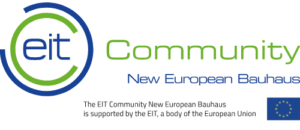An interview with the Royal Melbourne Institute of Technology (RMIT) Europe
Introduction:
The New European Bauhaus (NEB) is an initiative launched by the European Commission, aiming at instilling the principles of the European Green Deal into cities and towns. The main goal of the New European Bauhaus initiative is to empower citizens to envision a future that is beautiful for our eyes, minds, and souls.
The EIT Community has developed educational resources to help learners and professionals to understand how they can improve their local areas, following the New European Bauhaus principles.
The courses can be accessed here and more will be added in the next few months. A key partner in developing these courses has been RMIT Europe, who are contributing with their thoughts on why professionals would benefit from taking New European Bauhaus courses and what difference it could make to their local communities.
1. Who are RMIT and how and when did your involvement in the NEB initiative start?
RMIT University is a global university of technology, design and enterprise. We have over 97,000 students from more than 230 different countries. We are among the top 200 universities worldwide.
Our European innovation hub in Barcelona serves as the gateway for research, industry, government and enterprise in Europe to innovation and talent in Australia and Asia.
We were proud to become a member of the New European Bauhaus in 2021, with our values and goals as a global institution aligning with those of the NEB.
As part of the NEB Festival in 2022, we ran a place-based workshop with RMIT’s PlaceLab at the Barcelona Centre for Design. Members of the community took part and used ‘moodboarding’ as a method to reflect on the current city and on more sustainable and resilient designs for future cities. Watch a video of the workshop in Barcelona.
Together with the EIT Community, we also developed a suite of online and free short courses on topics connected with the NEB values of sustainability, aesthetics and inclusion.
2. What will learners find when they explore our NEB courses?
Our courses are designed to help learners to achieve a sense of belonging, an integral step in creating healthy neighbourhoods and revitalising a sense of community connection.
We take our learner through a journey of approaches to citizen engagement in urban development to achieve transformational societal goals.
Our courses help learners to focus on how to create ethical, sustainable, inclusive, and well-governed cities through the local implementation of frameworks including the NEB, European Green Deal and the Sustainable Development Goals (SDGs).
We also show how urban nature can be leveraged to overcome challenges that cities are facing today, including extreme weather, food security, and the social impact that these issues bring.
3. How are the courses relevant to the wide range of professionals out there trying to make cities more liveable?
Professionals, as well as city officials, aiming for cities that are more liveable, healthier and more sustainable, will find these courses a useful resource to access rich learning material and case studies, to connect with peers around the world and to gain practical and relevant skills.
Since their launch, we’ve seen hundreds of learners around the world join these courses to share their experiences from their own cities as well as be inspired by others.
4. What skills will people taking these courses be able to gain or improve?
Our courses will help learners upskill or reskill across a range of areas, including:
- Evaluate NEB principles and approaches to citizen engagement, belonging and sustainability in cities
- Interpret models of citizen participation and their application as well as demonstrate an understanding of co-design principles
- Explore and analyze case studies where belonging is designed in digital and non-digital environments
- Interpret the environmental and social impact of nature-based solutions and how biodiversity impacts human health, wellbeing and environmental resilience
- Explain the concept of ethical cities
5. Conclusions – Why would you tell people thinking about taking a New European Bauhaus course? Why should they do so?”
Understanding the framework of the NEB can help professionals and city officials inform their decision-making for more liveable, healthier and more sustainable cities.



No comments yet